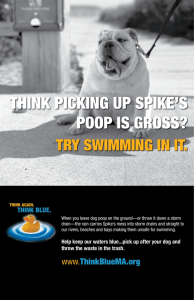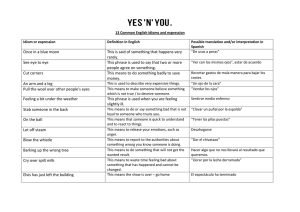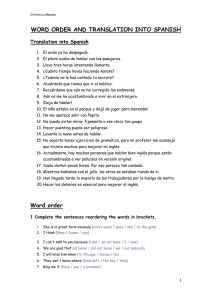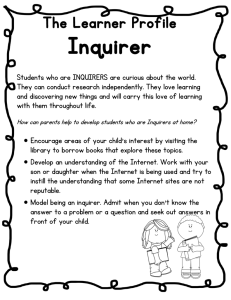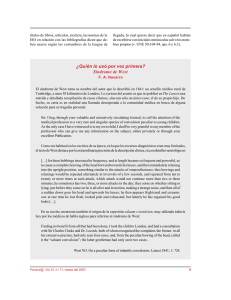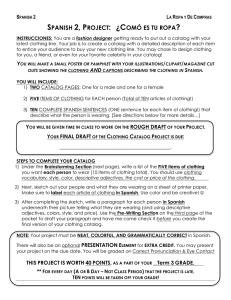La ropa y el cuerpo La ropa y el cuerpo
Anuncio
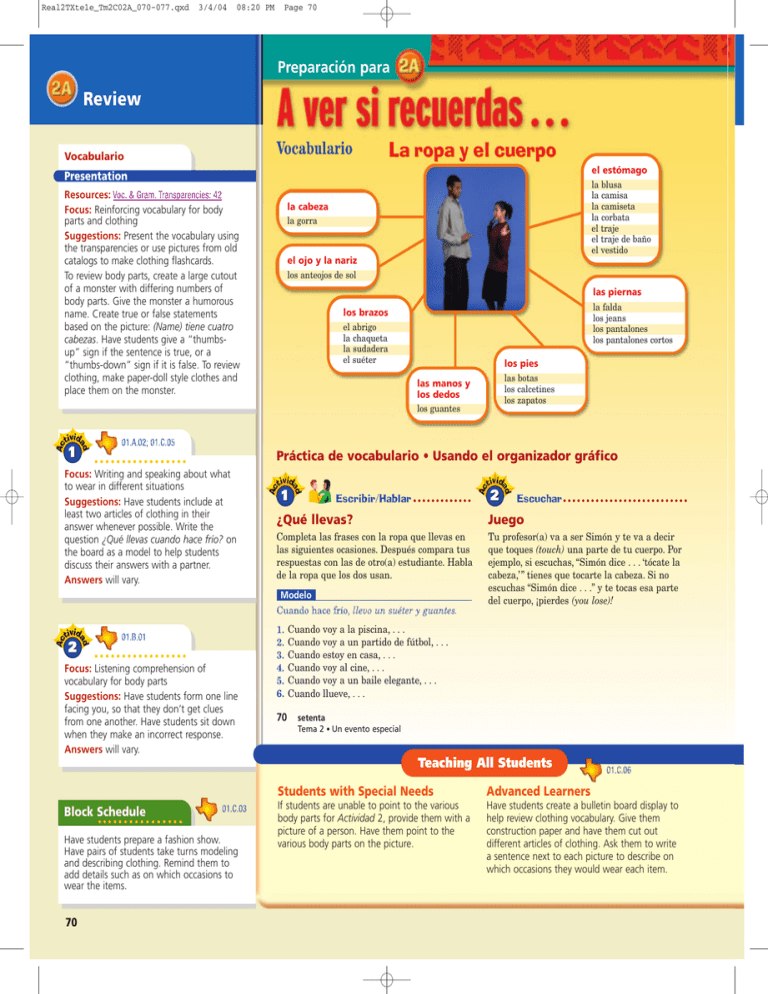
Real2TXte1e_Tm2C02A_070-077.qxd 3/4/04 08:20 PM Page 70 Preparación para Review Vocabulario Vocabulario La ropa y el cuerpo el estómago la blusa la camisa la camiseta la corbata el traje el traje de baño el vestido Presentation Resources: Voc. & Gram. Transparencies: 42 Focus: Reinforcing vocabulary for body parts and clothing Suggestions: Present the vocabulary using the transparencies or use pictures from old catalogs to make clothing flashcards. To review body parts, create a large cutout of a monster with differing numbers of body parts. Give the monster a humorous name. Create true or false statements based on the picture: (Name) tiene cuatro cabezas. Have students give a “thumbsup” sign if the sentence is true, or a “thumbs-down” sign if it is false. To review clothing, make paper-doll style clothes and place them on the monster. la cabeza la gorra el ojo y la nariz los anteojos de sol las piernas la falda los jeans los pantalones los pantalones cortos los brazos el abrigo la chaqueta la sudadera el suéter los pies las botas los calcetines los zapatos las manos y los dedos los guantes 01.A.02; 01.C.05 Práctica de vocabulario • Usando el organizador gráfico Ac 1 tivid Escribir/Hablar ••••••••••••••••• Focus: Listening comprehension of vocabulary for body parts Suggestions: Have students form one line facing you, so that they don’t get clues from one another. Have students sit down when they make an incorrect response. Answers will vary. 2 Escuchar ¿Qué llevas? Juego Completa las frases con la ropa que llevas en las siguientes ocasiones. Después compara tus respuestas con las de otro(a) estudiante. Habla de la ropa que los dos usan. Tu profesor(a) va a ser Simón y te va a decir que toques (touch) una parte de tu cuerpo. Por ejemplo, si escuchas, “Simón dice . . . ‘tócate la cabeza,’ ” tienes que tocarte la cabeza. Si no escuchas “Simón dice . . .” y te tocas esa parte del cuerpo, ¡pierdes (you lose)! Modelo Cuando hace frío, llevo un suéter y guantes. 01.B.01 ad tivid ad Focus: Writing and speaking about what to wear in different situations Suggestions: Have students include at least two articles of clothing in their answer whenever possible. Write the question ¿Qué llevas cuando hace frío? on the board as a model to help students discuss their answers with a partner. Answers will vary. Ac ••••••••••••••••• 1. 2. 3. 4. 5. 6. 70 Cuando Cuando Cuando Cuando Cuando Cuando voy a la piscina, . . . voy a un partido de fútbol, . . . estoy en casa, . . . voy al cine, . . . voy a un baile elegante, . . . llueve, . . . setenta Tema 2 • Un evento especial Teaching All Students Block Schedule 01.C.03 ••• •• • • • • • • • • • • • Have students prepare a fashion show. Have pairs of students take turns modeling and describing clothing. Remind them to add details such as on which occasions to wear the items. 70 01.C.06 Students with Special Needs Advanced Learners If students are unable to point to the various body parts for Actividad 2, provide them with a picture of a person. Have them point to the various body parts on the picture. Have students create a bulletin board display to help review clothing vocabulary. Give them construction paper and have them cut out different articles of clothing. Ask them to write a sentence next to each picture to describe on which occasions they would wear each item. Real2TXte1e_Tm2C02A_070-077.qxd 3/4/04 08:25 PM Page 71 Review Verbs and expressions that use the infinitive When you use two verbs together in Spanish, the second one is usually the infinitive. Óscar prefiere llevar jeans los fines de semana. ¿Vas a llevar un suéter esta noche? Presentation 04.A • Here are some verbs and expressions that you have used that are often followed by an infinitive: me gusta / gustaría me encanta poder (o ➞ ue) deber preferir (e ➞ ie) querer (e ➞ ie) pensar (e ➞ ie) necesitar tener que ir a I like / would like I love to be able ought to, should to prefer to to to to to Resources: Voc. & Gram. Transparencies: 43 Suggestions: Model each word or phrase with a sentence, and ask students follow-up questions: Puedo cantar bien. ¿Y tú? ¿Puedes cantar o prefieres bailar? want plan need have to be going to You can use the present tense of the verb acabar followed by de + the infinitive to indicate that something has just happened: Nosotros acabamos de escuchar esa canción. 01.B.02 01.C.06 We just listened to that song. ••••••••••••••••• Práctica de gramática Ac Ac 3 tivid Leer/Escribir ad ad tivid 4 Hablar Un mensaje electrónico ¿Qué quieres hacer? Recibes este mensaje por correo electrónico. Lee las actividades que recomienda Carlos y contéstale. Usa una combinación de dos verbos para decirle lo que te interesa hacer y lo que no te interesa hacer. Pregúntale a otro(a) estudiante si quiere hacer algo este fin de semana. Modelo A —¿Quieres ir al parque conmigo? conmigo? B —Sí, me gustaría ir al parque pero acabo de ¡Hola! 1. 2. 3. 4. ir al cine estudiar español tomar un refresco jugar al béisbol 5. venir a mi casa 6. escuchar música 7. ¡Respuesta personal! Carlos Más práctica Practice Workbook 2A-A, 2A-B For: Review of vocabulary and grammar Visit: www.phschool.com Web Code: jdd-0201 setenta y uno Preparación: Vocabulario y gramática 01.C.03 tivid 71 Enriching Your Teaching Teacher-to-Teacher Internet Search If possible, borrow a skeleton from a science teacher to review body parts and clothing. Bring in clothes to put on the skeleton. Dress it with a different outfit each day for a week and have students describe the outfit as a warm-up activity. Be sure to plan humorous outfits! To provide students with visuals while reviewing clothing, have them look at a Web site for a department store or mail-order company in a Spanish-speaking country. Keywords: ad ¿Qué quieres hacer este fin de semana? ¿Comer en un restaurante? Todos dicen que el restaurante Las Pampas tiene comida argentina fabulosa. ¿Prefieres ir a un concierto? Hay una banda que toca música de los Andes en la plaza. ¿Jugar al tenis? Dicen que va a hacer buen tiempo todo el fin de semana. Escríbeme. caminar con mi amiga. No, gracias. No puedo ir porque mi primo acaba de llegar. Ac o: Focus: Reading and writing a response to an e-mail about likes and dislikes Suggestions: Point out that the message is about plans for the upcoming weekend. Ask students to brainstorm possible activities that they might see in the message. Encourage students to use a variety of verbs: Me gustaría comer en Las Pampas. Me encanta jugar al tenis. Answers will vary. Extension: Have students write Carlos a response agreeing with some suggestions that he has made and providing one or two additional suggestions. 4 01.A.01; 01.A.02; 01.A.03 ••••••••••••••••• Focus: Talking about plans for the weekend Suggestions: Have students use each of the words or expressions in the Gramática chart at least once. Remind them that they must elaborate on their response if they agree to go, and must make an excuse if they cannot. Answers will vary. comprar + ropa + online 71
